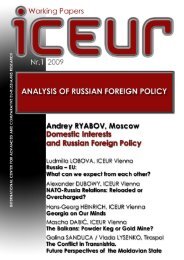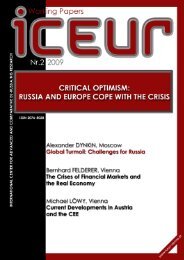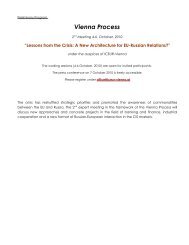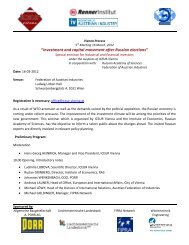EU-Russia: New Departures and Old Habits - ICEUR-Vienna
EU-Russia: New Departures and Old Habits - ICEUR-Vienna
EU-Russia: New Departures and Old Habits - ICEUR-Vienna
You also want an ePaper? Increase the reach of your titles
YUMPU automatically turns print PDFs into web optimized ePapers that Google loves.
Contributions by senior students (<strong>Vienna</strong> University, Department of Political Science)<br />
Richard SATTLER<br />
Developing the European security strategy<br />
The following article strives to analyze the positions of the European Union (<strong>EU</strong>) <strong>and</strong> the <strong>Russia</strong>n<br />
Federation concerning a European security architecture <strong>and</strong> its future possibilities. From this vantage point,<br />
the interests of <strong>Russia</strong> <strong>and</strong> the <strong>EU</strong> appear to be bent on continuing the status quo of inter- <strong>and</strong> transnational<br />
institutions <strong>and</strong> also the interests to change them. Finally, we will point out some perspectives under these<br />
conditions of international relations.<br />
Common Security <strong>and</strong> Defense Policy (CSDP)<br />
Until this day, the foreign policy of the <strong>EU</strong> has focused on regional levels. The adjustment to the new frame<br />
of security policy as it has been developed following the end of the Cold War is progressing at a painfully<br />
slow pace. In this situation, the <strong>EU</strong> does not use its full potential to behave as a global actor. 1<br />
The CSDP is part of the Common Foreign <strong>and</strong> Security Policy (CFSP) which was ratified in Maastricht<br />
1992. The concept implies a concentration of decisions relating to security <strong>and</strong> defense policy in the h<strong>and</strong>s of<br />
the <strong>EU</strong> like humanitarian assignments, rescue missions, peacekeeping challenges <strong>and</strong> battle group<br />
interventions in crisis situations. Working councils are the military committee, the military staff of the <strong>EU</strong>,<br />
the council on civilian aspects of crisis management <strong>and</strong> also external experts. In the multilateral sphere the<br />
most import institutions for international cooperation <strong>and</strong> partnership are the United Nations (UN) <strong>and</strong> the<br />
North Atlantic Treaty Organisation (NATO). The concept of policy is based on the Security Strategy of the<br />
European Union which was ratified in 2003. Its goals are the enlargement of the security zone around<br />
Europe, the reinforcement of international order by associations <strong>and</strong> the response to risks <strong>and</strong> threats like<br />
terrorism <strong>and</strong> natural disasters. 2<br />
Using these tools, the <strong>EU</strong> zeroes in on a consolidation of NATO-partnership <strong>and</strong> tries to establish the Union<br />
as a geopolitical actor. In this role, the <strong>EU</strong> has to find a clear position towards the <strong>Russia</strong>n Federation.<br />
Otherwise the <strong>Russia</strong>n Federation will not recognize the <strong>EU</strong> as an equivalent actor of power in international<br />
politics on a par with the United States of America. 3<br />
<strong>Russia</strong> <strong>and</strong> the European Union<br />
<strong>Russia</strong> views the <strong>EU</strong> as a future partner in security policy. In keeping with its self-image of a superpower, the<br />
<strong>Russia</strong>n Federation also tries to maintain the independence of its foreign policy. In the doctrines on military<br />
<strong>and</strong> foreign policy (2000), <strong>Russia</strong> emphasises the coherence of internal security <strong>and</strong> economic development<br />
with the goals of foreign policy. The Summit of Saint Petersburg in 2003 was a further step in the<br />
cooperation of the <strong>Russia</strong>n Federation <strong>and</strong> the <strong>EU</strong>. 4<br />
The main interest of the <strong>Russia</strong>n Federation, however, is to strengthen its position in the Commonwealth of<br />
Independent States (CIS). The expansion of NATO through the inclusion of Eastern European States, <strong>and</strong><br />
particularly the interest of Georgia to join the treaty are perceived as being detrimental to <strong>Russia</strong>´s interests.<br />
Despite these problems the <strong>Russia</strong>n Federation does not want to lose the <strong>EU</strong> as a partner which is seen as a<br />
counterweight to the USA. 5 The success of <strong>Russia</strong>n foreign policy mostly depends on the competency to<br />
create <strong>and</strong> maintain international cooperation <strong>and</strong> coalitions. In this aspect the <strong>Russia</strong>n<br />
1Cf. Frank, Johann (2009): Die Entwicklung der Sicherheitsstrategie der Europäischen Union. Von der Europäischen<br />
Sicherheitsstrategie 2003 zum Fortschrittsbericht 2008. A.d.R.: Schriftenreihe der L<strong>and</strong>esverteidigungsakamdemie 7/2009,<br />
BMLVS Bundesministerium für L<strong>and</strong>esverteidigung und Sport (Hg.), Wien, S. 7-11<br />
2Cf. ebd. 45-49, 81-87, 130f; Vgl. BMLVS (Hg., 2009): Weissbuch 2008. Wien, S. 24-28<br />
3Cf. Karaganov, Sergei (2009): <strong>Russia</strong> in Euro-Atlantic Space. In: SOLON-line.de, Wiesbaden-Amöneburg, In:<br />
http://www.solon-line.de/russias-place-in-euro-atlantic-space.html (24.05.2010)<br />
4Cf. Schulze, Peter W. (2005): Vom Paria zum Partner: Russl<strong>and</strong>s Rückkehr als Machtfigur der internationalen Politik. In: Piehl,<br />
Ernst/Schulze, Peter W./Timmermann, Heinz: Die offene Flanke der Europäischen Union. Russische Föderation, Belarus,<br />
Ukraine und Moldau. Berliner Wissenschafts-Verlag, Berlin, S. 190, 192-195, 199, 216f<br />
5 Cf. Frank, Johann (2009): Die Entwicklung der Sicherheitsstrategie der Europaischen Union. Von der Europaischen<br />
Sicherheitsstrategie 2003 zum Fortschrittsbericht 2008. A.d.R.: Schriftenreihe der L<strong>and</strong>esverteidigungsakamdemie 7/2009,<br />
BMLVS Bundesministerium fur L<strong>and</strong>esverteidigung und Sport (Hg.), Wien, S. 65<br />
IC<strong>EU</strong>R-<strong>Vienna</strong> Working Papers 3|2010 20









